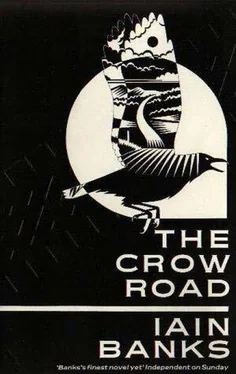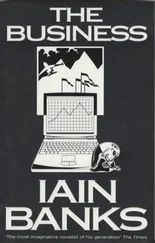Iain Banks - The Crow Road
Здесь есть возможность читать онлайн «Iain Banks - The Crow Road» весь текст электронной книги совершенно бесплатно (целиком полную версию без сокращений). В некоторых случаях можно слушать аудио, скачать через торрент в формате fb2 и присутствует краткое содержание. Год выпуска: 1992, Жанр: Современная проза, на английском языке. Описание произведения, (предисловие) а так же отзывы посетителей доступны на портале библиотеки ЛибКат.
- Название:The Crow Road
- Автор:
- Жанр:
- Год:1992
- ISBN:нет данных
- Рейтинг книги:5 / 5. Голосов: 1
-
Избранное:Добавить в избранное
- Отзывы:
-
Ваша оценка:
- 100
- 1
- 2
- 3
- 4
- 5
The Crow Road: краткое содержание, описание и аннотация
Предлагаем к чтению аннотацию, описание, краткое содержание или предисловие (зависит от того, что написал сам автор книги «The Crow Road»). Если вы не нашли необходимую информацию о книге — напишите в комментариях, мы постараемся отыскать её.
The Crow Road — читать онлайн бесплатно полную книгу (весь текст) целиком
Ниже представлен текст книги, разбитый по страницам. Система сохранения места последней прочитанной страницы, позволяет с удобством читать онлайн бесплатно книгу «The Crow Road», без необходимости каждый раз заново искать на чём Вы остановились. Поставьте закладку, и сможете в любой момент перейти на страницу, на которой закончили чтение.
Интервал:
Закладка:
So it was a desultory kind of phone call. I felt pretty depressed myself at the end of it. I didn't ask her about her love-life.
I put the phone down feeling the same way I had a year earlier, the day I'd been travelling from Gallanach to Glasgow after Hogmanay, and I'd pretended to be asleep when the train stopped at Lochgair. Remembering that cowardice and that shame, I almost picked the phone up again to call Ash back, and my hand reached out a couple of times, and I debated with myself, muttering, my face contorting with silly expressions, and I told myself I was acting like a madman, and I really wanted to make that call and I really ought to, but I was terrified to do it as well, even though I knew that I should… shouldn't I? Yes; yes I should; yes I definitely ought to, it was obvious, clear definite. I should.
But in the end I didn't.
At least there was always work to be done. I'd submerged myself in my studies with a feeling of almost orgasmic relief. The very fact the past can be taken or left made me want to accept it; the sheer demanding immediacy of the present made it repulsive.
And so everything returned to a sort of normality, which didn't last, of course.
On Wednesday, the 23rd of January 1991, shortly after noon, Fergus Walter Cruden Urvill left Gaineamh Castle in his Range Rover and travelled north through the town of Gallanach and the village of Kilmartin, passing Carnasserie Castle and the cairn and standing stone at Kintraw, crossed the thin flood plain of the Barbreck River above Loch Craignish, travelled inland again to rejoin the shore at the cut-off for the Craobh Haven marina development, and then curved past the village of Arduaine, skirting Loch Melfort before passing through Kilmelford and entering the forest that led to Glen Gallain and then down to the shore of Loch Feochan and the twisting road heading for Oban. The Range Rover passed through the town a little before one o'clock and continued north to Connel, waited for the traffic lights to change at the old bridge over the Falls of Lora, then crossed, negotiated some roadworks and finally turned left off the road a little further on, entering the thin strip of level coastal ground that was the Connel airstrip.
Fergus Urvill parked the Range Rover in the airfield car park. He talked to one Michael Kerr, from the village of Benderloch a couple of kilometres up the road from the field. Kerr was repairing the car-park fence; Mr Urvill said he wanted to use the telephone in the Portakabin that served as the airfield office. Michael Kerr said that Mr Urvill seemed in a good mood, and told him that he would be flying out to one of the Outer Herbrides ('the Utter He-Brides," were his exact words), where an old school friend lived. He was going to surprise this friend and take him a bottle of whisky for a belated Hogmanay. He showed Michael Kerr the bottle of Bowmore whisky he was taking with him, in a small leather suitcase which also contained some clothes and toiletries. The only thing Kerr noticed that was out of the ordinary was that Mr Urvill grimaced a couple of times, and flexed his shoulders oddly. Kerr asked the older man if he was all right, and Fergus said yes, but it felt like a couple of ribs were acting up a little. An old injury; nothing to worry about.
Mrs Eliza McSpadden, the housekeeper at the castle, had confirmed that Mr Urvill had complained of chest pains the night before, and had taken some Paracetamol painkillers. He had taken a box of the tablets with him that morning, when he drove to Connel. He had said he would be away for a couple of days, and — apparently on impulse as he was about to get into the car — asked Mrs McSpadden to prepare some of her Cullen Skink soup for his lunch on the Friday. He wouldn't need more as he would be dining with Mrs Mary McHoan in Glasgow that evening, before the opera. The Colonial restaurant in Glasgow later confirmed that they had a booking for two for the Friday evening in Mr Urvill's name.
When Mr Urvill came back out of the airfield office, it was about one-thirty. Michael Kerr helped him check the Cessna aircraft. The plane taxied to the end of the runway, faced into a wind and then took off into a five-knot south-westerly breeze, in good visibility under a five-thousand-foot cloud-base of light overcast. The forecast said the breeze would freshen and veer to the south east that evening, and the following few days would be bright and clear with a steady southerly wind of force three or four.
The Cessna was spotted by the British Army radar base on the island of St Kilda flying into an area that was restricted for missile testing. The light aircraft was flying at an altitude of two thousand feet on a bearing of 320°, which would take it towards Iceland. There was no radio response from the plane, and an RAF Nimrod, on patrol over the North Atlantic, was diverted to intercept.
The Nimrod rendezvoused with the light aircraft at 1516 GMT. It decreased speed and flew almost alongside, a little above and ahead of the Cessna for twenty-five minutes, attempting to make radio and visual contact. The Nimrod crew reported that the single occupant of the plane seemed to be unconscious, slumped back in his seat.
At 1541 GMT the Cessna's engine started to cut out and the plane — presumably out of fuel — began to lose altitude. The engine stopped altogether less than a minute later. The plane pitched forward, causing the pilot's body to slump over the controls, whereupon the aircraft went into a steep dive and started to spin. It fell into the sea, impacting at 1543.
The Nimrod circled, dropping a life raft and reporting the position of the wreck to nearby shipping. The plane sank twenty minutes later, as the sun was setting. There was little visible wreckage. An East German trawler picked up the Nimrod's liferaft during the following morning.
The crew of the Nimrod reported that at no time had the figure on board the light aircraft shown any sign of consciousness.
"Hello?"
"Prentice?"
"Speaking. Is —?
"It's Ashley. I just heard about Fergus."
"Ashley! Ah… Yeah. I heard this afternoon. I was going to call; I don't have your work number."
"Well?"
"Well, what?"
"Do you know any more than what's been on the news?"
"Well, mum went up to the castle to see if Mrs McSpadden needed a hand, and she said she seemed kind of shell-shocked; kept talking about soup."
"Soup?"
"Soup. Cullen Skink, specifically."
"Oh."
"Yeah, well, apparently Fergus seemed in good spirits, but he'd had some chest pains, the night before. Anyway, he drove up to Connel to fly out to the Hebrides to see some chum of his out there, and next thing we know he's dive-bombing the Atlantic and forgetting to pull up. Unconscious, apparently."
"Hmm… so what do you think?"
"Well, I don't know. Mum said she asked Mrs McSpadden who he was going to see, and she said she didn't know who it could have been. The police had already asked her that, apparently; they said they would make enquiries."
"Right. You think it was a heart attack?"
"I don't know. Umm…
"What?"
"Well, apparently Mrs McSpadden said Fergus had a phone call the night before. She took it initially, then handed the phone to him."
"Yeah? And?"
"Whoever it was, they were Scottish, but it was an international phone call; a satellite call. Mrs McSpadden thought she recognised the voice but she wasn't sure."
"Hmm. Recognised the voice."
"Yeah. Did… I mean, did she know Lachy?"
"Yes. Yes, she did. They both worked behind the bar in the Jac, about… twenty years ago, maybe."
"Ah-ha."
"Ah-ha indeed."
I took a deep breath. "Look, Ash, I've been mean — " I heard a noise in the background.
Читать дальшеИнтервал:
Закладка:
Похожие книги на «The Crow Road»
Представляем Вашему вниманию похожие книги на «The Crow Road» списком для выбора. Мы отобрали схожую по названию и смыслу литературу в надежде предоставить читателям больше вариантов отыскать новые, интересные, ещё непрочитанные произведения.
Обсуждение, отзывы о книге «The Crow Road» и просто собственные мнения читателей. Оставьте ваши комментарии, напишите, что Вы думаете о произведении, его смысле или главных героях. Укажите что конкретно понравилось, а что нет, и почему Вы так считаете.












